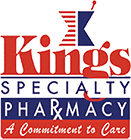Specialty Pharmacies focus on specialty and rare medications that treat infertility, Chrons disease, HIV, HEP C, and other illnesses. In 2016, pharmacies dispensed about $115 billion in specialty drugs, according to industry expert Adam Fein, PhD, President of Pembroke Consulting, Inc. and CEO of the Drug Channels Institute, a blog that provides analysis of pharmaceutical economics and distribution trends.
And while the specialty pharmacy industry is rising, with some estimates targeted to $240 by the end of 2017, the industry is shrinking, with fewer and fewer specialty pharmacies to chose from outside of the big box chains.
“In New York especially, we’re seeing many specialty pharmacies in NYC disappear,” says owner Ron DelGaudio. “With fewer savings programs from the pharma companies, it’s harder to compete with the big box chains.” In addition, some drug manufacturers are launching specialty drugs with narrow distribution networks, often to fewer than 25 pharmacies. Those pharmacies are usually larger ones, making it increasingly difficult for low-cost pharmacies to compete.
In the past, specialty pharmacies in NY could apply for “loyalty” programs from companies like Merck and Phizer. Now those cost-savings opportunities are also fewer and further between.
Local pharmacies are having to invest more time and money in studying the industry, healthcare trends, pharmaceutical trends, and trends in illnesses, to navigate which medications are most important for to keep on the shelves and reduce operational costs like relocating outside of New York City to the Brooklyn and Bronx areas.
“Over the next years you’ll find fewer fertility pharmacies in NYC,” says DelGaudio. “The box chains will stay, but for special savings, customers will have to look for pharmacies outside of the city.” The other option is mail and central-fill pharmacies, which today account for upwards of 70% of specialty medication fulfillment. That number is increasing yearly. “The difficult thing is that with many of these complex specialty medications, customer care is extremely important — you want to make sure you have a pharmacist who makes sure the drug works alongside your other medications, that you’re storing and handling it correctly, that you’re injecting it correctly — these are services a mail pharmacy will find more difficult to provide,” says Ronda Lopez, a pharmacist at Kings.
Our main focuses are continuing to improve patient care and keep down healthcare costs. Second to that, we’re constantly embracing and re-embracing the shifts in the market. For those of us in the industry we know that specialty drugs are usually all of the three H’s: High Cost, High Complexity, High Touch. We joke that staying afloat in the pharmacy industry requires the same – High Cost, High Complexity, and High Touch.



